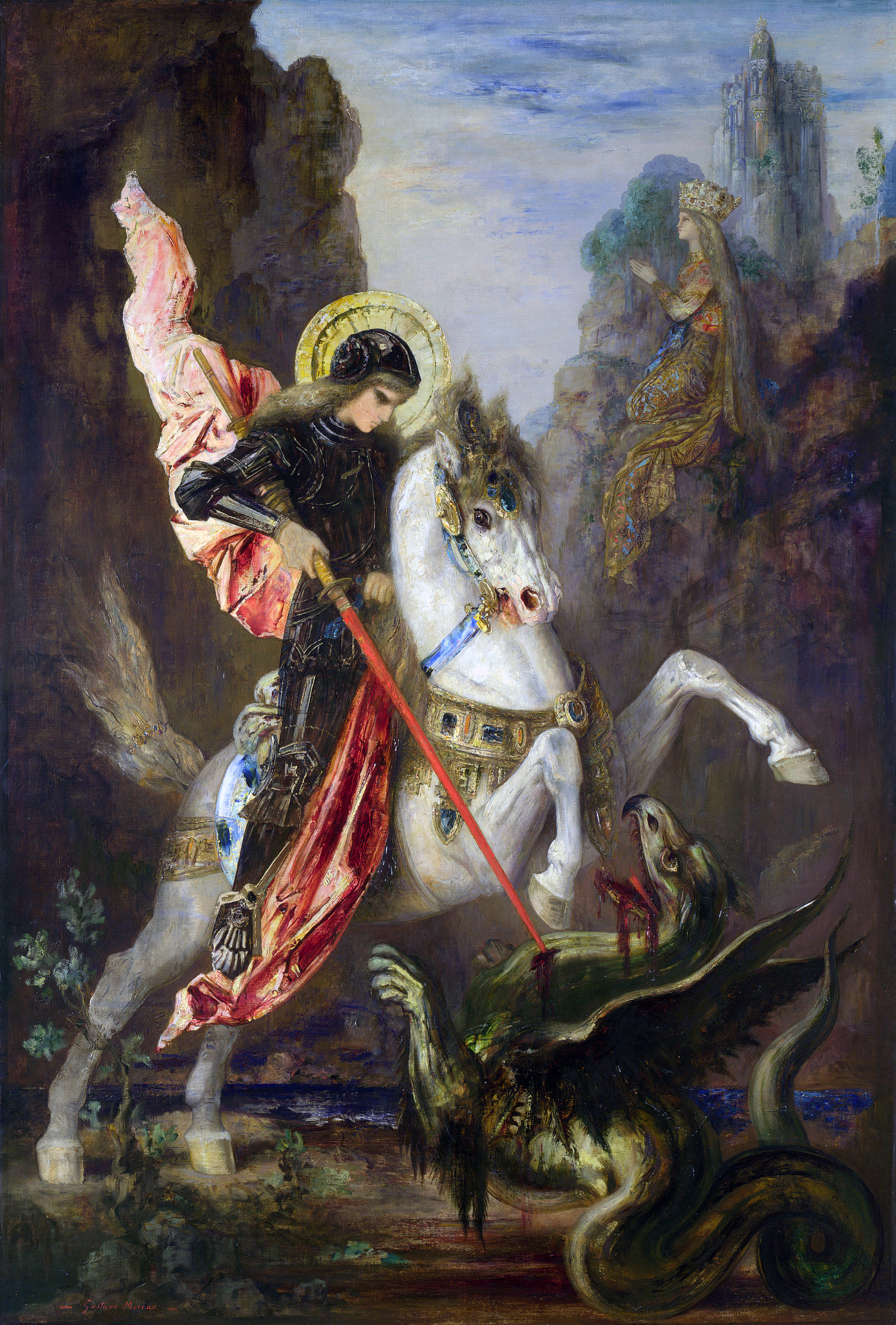Disclaimer: This entry is lengthy and heavily academic. I don't intend to persist in this style, but I think it's very important in establishing my motivational basis for the blog. More anecdotal entries are to come!
A few months ago, I attended a series of adult faith formation lectures given by a seminarian visiting my parish for the late spring/early summer. (Prior to entering the seminary he was a graduate physics student from Germany; his example is a refreshing reminder of how science and faith complement, not contradict, each other.) His first talk was titled, "On the Benefit of Dragons." Now, most people in the Western world see dragons as fierce monsters and associate them with danger, evil. I imagine I wasn't the only person in attendance curious about how something sinister could serve a beneficial purpose. I probably was also not alone in wondering why a physicist turned Catholic seminarian was going to be talking about green, scaly creatures that sometimes fly and breathe fire and are usually either guarding a massive hoard of treasure or holding a beautiful damsel captive.
It turned out, for the most part, that the talk was not about mythological lizards. Instead, he introduced me to the discipline of theodicy (of which I can only scratch the surface here). As it applies to Catholicism, it is an attempt to reconcile the four basic principles of the Church's dogma:
- God is omnipotent.
- God is omnipresent.
- God is omnibenevolent [all-good].
- Evil exists.
Most Cradle Catholics and even converts to the faith are indoctrinated with the notion of an all-powerful, ever-present, all-loving God. But no one of sound mind can rightly deny the evidence that evil nonetheless manifests itself in our midst. As the argument goes: If God is omnipresent and omnibenevolent, then He must not be omnipotent. Or, if God is omnipotent and omnibenevolent, He must not be omnipresent. Or, most painfully, if God is omnipotent and omnipresent, He must not be omnibenevolent.
As Seminarian Daniel outlined, there are three kinds of evil: moral (the type with which most people are familiar), physical (or natural), and metaphysical (the most abstract type). Just to give a small number of examples:
Moral: Theft, murder, adultery, profanity
Physical: Natural disasters, poverty, loneliness, illness, death
Metaphysical: Being finite in quantity by virtue of its physical nature; that is, it lacks the complete goodness that belongs to the immaterial God alone. To use Daniel's analogy, "There could always be more cake, but there could never be an infinite amount of it."
In a metaphorical sense, these evils are the "dragons" that confront us in our lives. Some are more easily surmounted than others (moral > physical > metaphysical) through introspection and corrective action but they are all inherent to our human existence. But this sheds no light on why an all-powerful, ever-present, all-loving God would permit such pain and suffering.
The key concept to understand is that in order for us to experience the greatest good we must also have the potential to experience the greatest evil. In the biblical story of the creation of Adam and Eve, God gave them free will to choose to act in accordance with His will or not. This is a true act of love. While the Father could undoubtedly have created a world whose creatures were unwaveringly inclined to His will, this world of automatons would be incapable of experiencing the fullness of love that only free choice can give. Put another way, there could be no joy in receiving and returning the Father's affection if His creation had no choice in responding to it. This means that if mankind chooses to ignore or deny God's love it must also be ready to accept the consequences of that choice. In short, as paradoxical as it may sound, it is because God loves us that He allows the
potentiality (not inevitability) for evil in this world... so that we might experience the greatest good.
Moreover, does having evil in the world present us with the opportunity to show God's love to those who are suffering? How often do we see someone in pain and wish we could help him or her? Do we not give food to the hungry? Medicine to the sick? Encouragement to the doubtful? Comfort to the grieving? (I hope this list sounds familiar.) Does the suffering of others offer us the grace-filled capability to become like Christ?
Consider the
legend of Saint George and the Dragon:
Saint George and the Dragon by Gustave Moreau, 1889/1890
In the story, Saint George rescues the daughter of a Libyan king who is to be sacrificed as an appeasement to a plague-bearing dragon that had ravaged the countryside. Reinforcing himself with the Sign of the Cross, the knight charges the beast on horseback and seriously wounds it with his lance. He brings the creature to the city of Silene, where he slays the dragon in exchange for the people's conversion to Christianity.
What can we draw from this tale? The presence of evil, while lamentable in its own respect, presents us with the choice to submit to its influence or to be bearers of goodness and overpower its tenacious grasp. By helping others bear their burdens we affirm the love of God through our imitation of Christ. The evils that surround us may intimidate and sometimes paralyze us, but we can take solace in God's promise that He will deliver us unto redemption, so long as we are ready to reflect the love He has given us. This is "the benefit of dragons."
In developing this blog, Seminarian Daniel's presentation came to be a great motivation and inspiration. Through the exploration of everyday experiences I hope to expose the "dragons" that plague our existence and reframe those encounters as opportunities to draw closer to the one Lord who truly loves us. Indeed, we may find that theodicy is "the odyssey" to God...



